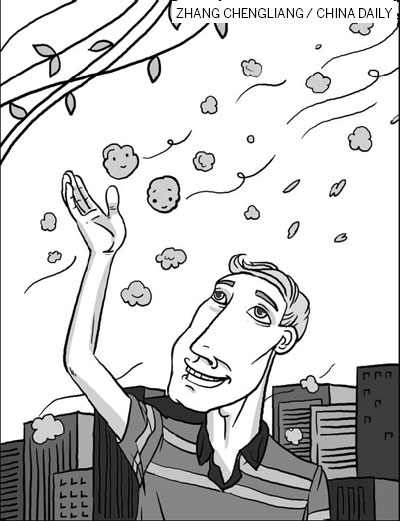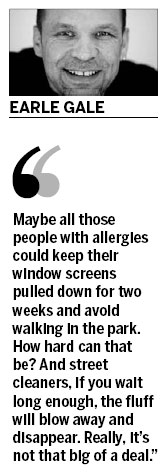

As a keen supporter of unfashionable Ipswich Town Football Club, an enthusiastic drinker of warm Tolly Cobbold beer and an avid listener to the music of the long-disbanded Velvet Underground, I know my taste in some things is not mainstream.
It would be easier to support Manchester United, drink Budweiser and listen to Lady Gaga but, hey, we are what we are.
While I'm used to being out of step more often than a one-legged soldier on the parade grounds, it came as a total surprise to learn that the rest of Beijing does not share my love of the two-week invasion of catkin fluff that blankets our city around this time each year.

The fluffy seeds are shed by the 3 million willow and poplar trees that line city streets and populate our parks. They become airborne when the weather hits 15 degrees Celsius.
This year, that moment began a little later than usual, starting during the May Day holiday.
Apparently, the billowing clouds of fluff that float so elegantly in the breeze for such a short time are seen as a major inconvenience by many locals.
Today, I will make the case for the defense. Far from being an object of hate, I say the fluff deserves our love.
I concede that, for residents suffering from allergies and respiratory diseases, the cotton balls may be a problem. I take on board the observation that they make cleaners' lives a misery. And I've heard the proclamation that they pose a fire risk.
But I am convinced that, for most of us, the wafting shoals of fluff are about as big a nuisance as a flock of butterflies. According to a METRO story last week, people have complained about the fluffy stuff to such an extent that the city started, in 2003, to carry out gender-bending sex-change operations on trees in a bid to sweep the problem under the carpet.
The story told us that female willow and female poplar trees are the ones responsible for producing the dust bunny invasion - apparently, the male trees are disinclined to produce anything of note because they spend all their time talking about sport.
So, the arbor authorities see the solution to the problem in turning frilly females into butch males, something that is achieved by slicing off high branches from female trees and grafting male branches onto the stubs, or by giving female trees chemical injections.
The Beijing municipal bureau of landscape and forestry tells us the city has 1.9 million poplars and 1.1 million willows. Among them, between 30 and 40 percent are "female".
So far, according to the Beijing Institute of Landscape Science, about 800 willows and 50,000 poplars have received chemical injections and sex-change operations - so there is quite a long way to go before all the hard work manifests itself in a decline in fluff.
It sounds like an awful lot of work and a great deal of expense, all for the sake of mitigating two weeks of very minor inconvenience.
It's time to take a different approach. Maybe all those people with allergies could keep their window screens pulled down for two weeks and avoid walking in the park. How hard can that be?
And street cleaners, if you wait long enough, the fluff will blow away and disappear. Really, it's not that big of a deal.
And as for fire risk, please, if we were really worried about fire risks, don't you think we'd start by banning pyrotechnics on New Year's Eve?
The truth is, there is nothing wrong with the fluffy stuff other than the complaints it elicits from the hypersensitive. The sooner we stop wasting time and energy trying to control nature, the better.
In fact, let's be creative with this problem and turn the crisis into an opportunity.
Why don't we start thinking of the fluff invasion as the beautiful symbol of the end of winter and the start of summer and see it as a time for great rejoicing?
We could call it the Fluff Festival. If we play our cards right, we might be able to lure tourists to Beijing just to witness the spectacle.
It could be like our version of the Japanese cherry blossom festival, or even be reminiscent of the far earlier tradition of flower viewing, hanami, that is said to date to the Heian Period (794-1191).
Tourists and locals alike might just come to love the fluff. Stranger things have happened.
In British Columbia, Canada, hoteliers on one of the most rugged and weather-ravaged stretches of coastline in the world were having no luck attracting tourists until they gave up trying to market the waterfront as an ideal location for a beach holiday and began selling it as the best place in the world to watch extreme weather and storms.
Today, tourists flock there.
It's all about playing the cards you have been dealt, not the ones you'd like to have.
So, let's invite the world to come and join us for two weeks in April or May and witness the beautiful moment when winter turns to summer, when the fluff flies and when Beijingers emerge from hibernation.
If we embrace the fluff, instead of trying to fight it, we might just come to love it.